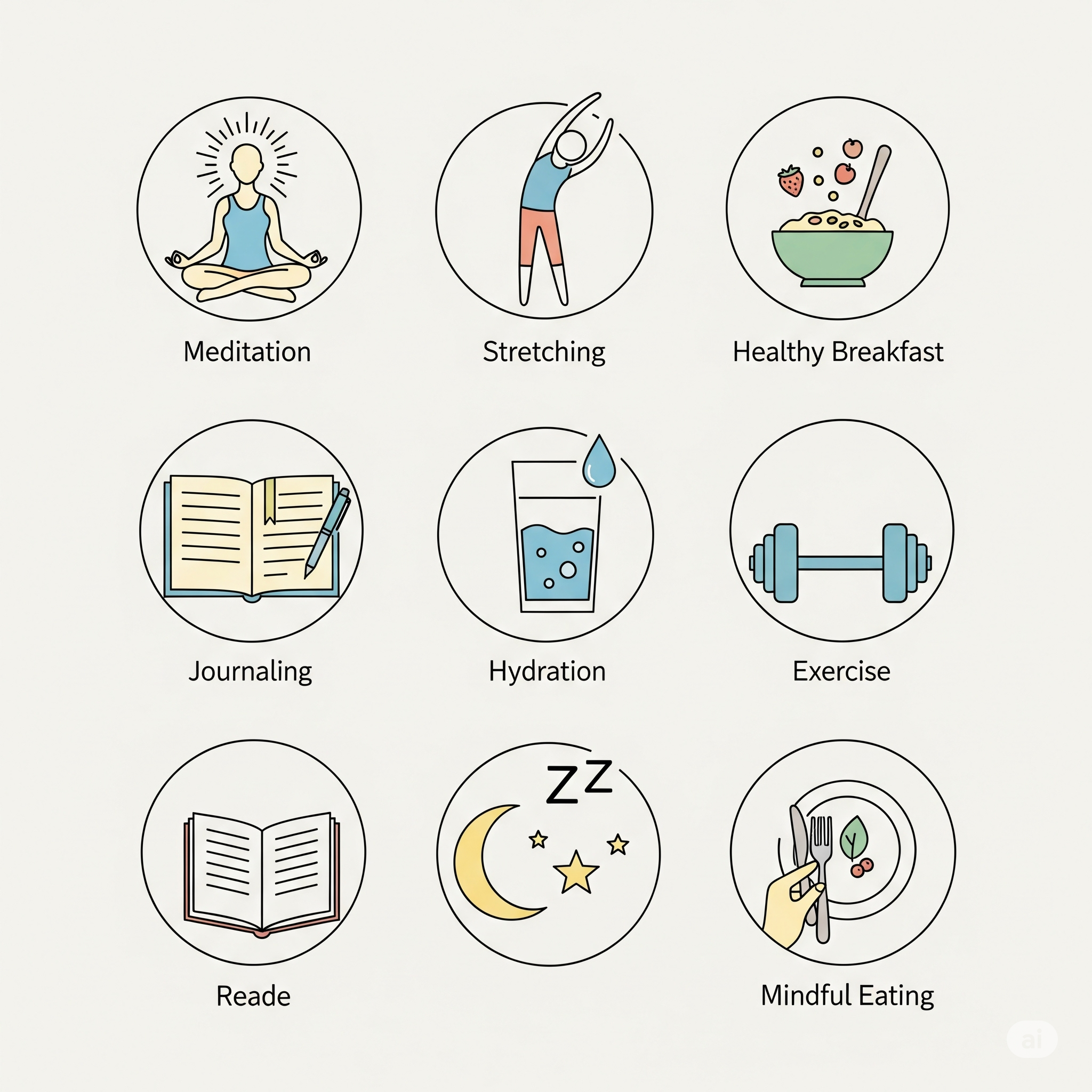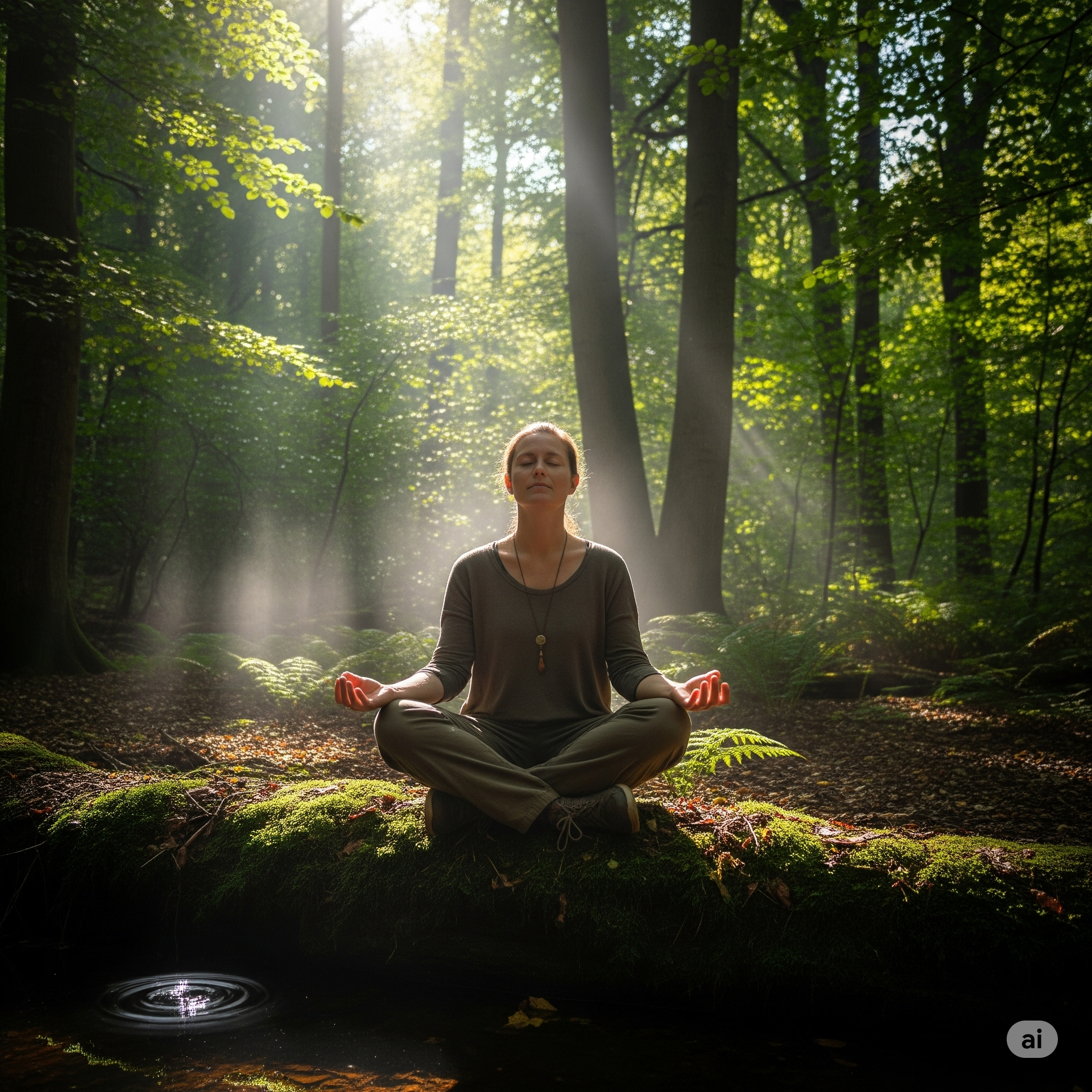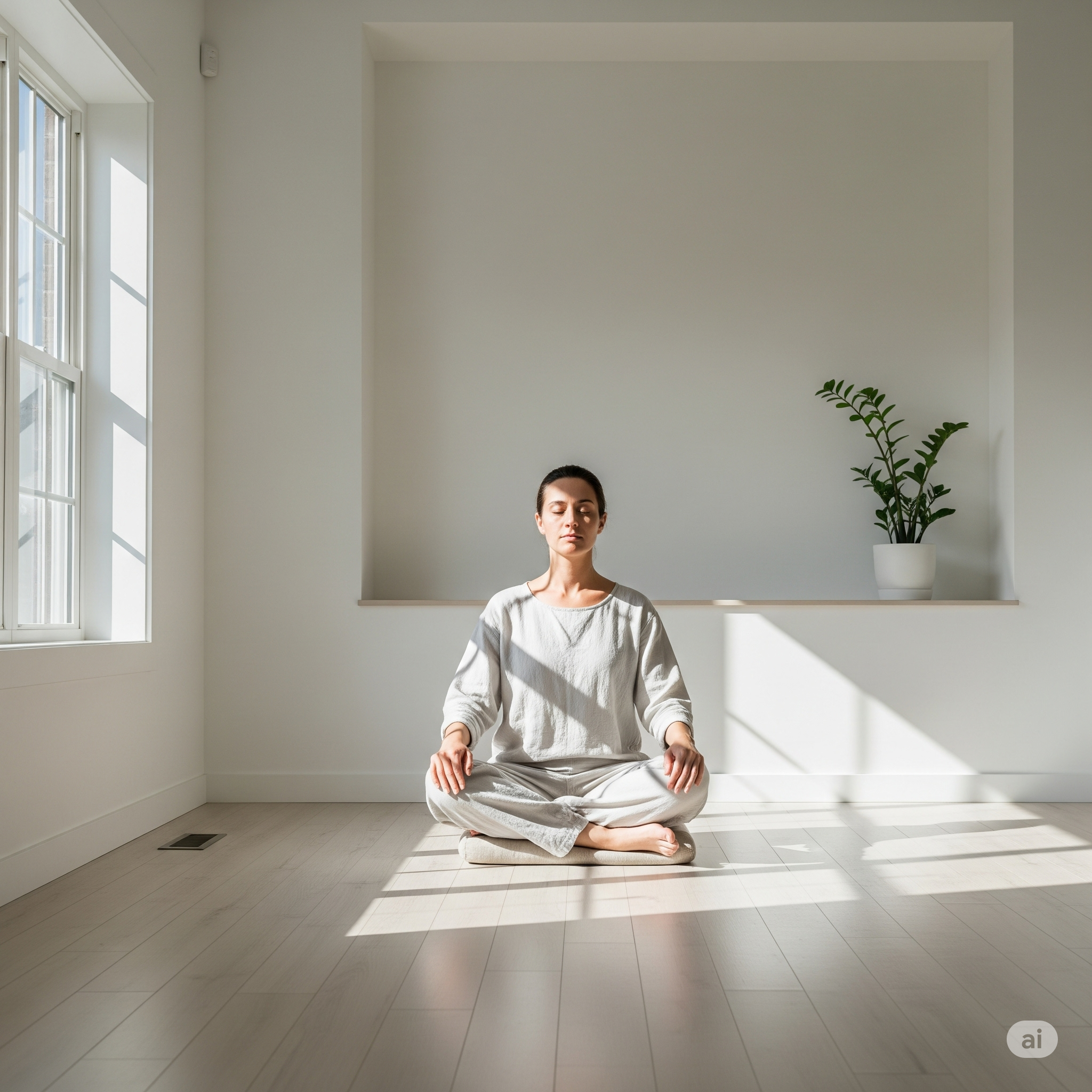Table of Contents
- A. Beyond Routine: Understanding the True Essence of Rituals
- B. The Science of Small Habits: Why Tiny Actions Yield Big Results
- C. The Profound Impact of Morning Rituals on Your Day
- D. Evening Rituals for Restful Sleep and Rejuvenation
- E. Nourishing Your Body: Daily Rituals for Optimal Nutrition
- F. Movement as Medicine: Integrating Exercise Rituals into Your Life
- G. Cultivating Inner Peace: Mental and Emotional Well-being Rituals
- H. The Social Connection Ritual: Nurturing Meaningful Relationships
- I. Creating Your Own Powerful Health Rituals: A Step-by-Step Guide
- J. Overcoming Obstacles: Sticking to Your Rituals in a Busy Life
- K. The Cultural Significance of Rituals and Their Health Implications
- L. Real-Life Examples: How Small Rituals Transformed Lives
- M. The Long-Term Rewards: The Cumulative Effect of Daily Rituals
- N. FAQ Section
- O. Conclusion: Embrace the Power of Your Daily Practices
A. Beyond Routine: Understanding the True Essence of Rituals
We all have routines – the habitual sequences of actions we perform without much conscious thought, like brushing our teeth or making coffee. But rituals go a step further. While a routine is simply a series of steps, a ritual is a deliberate practice infused with intention and often a sense of meaning. It’s the conscious engagement in an action, paying attention to the process and the feeling it evokes. Think of the difference between mindlessly scrolling through your phone in the morning versus deliberately taking a few moments for quiet reflection. Both are routines, but the latter carries the weight of intention and mindfulness, transforming it into a ritual.
In the context of health, rituals are small, consistently performed actions that are intentionally chosen to support our physical, mental, or emotional well-being. They are the conscious building blocks of a healthy lifestyle, far more powerful than sporadic attempts at grand overhauls. This article will delve into the profound impact of these seemingly small daily habits, revealing how the power of rituals can lead to significant and lasting health benefits, even here in Hasilpur, Punjab, Pakistan, and across the globe.
B. The Science of Small Habits: Why Tiny Actions Yield Big Results
The idea that small actions can lead to big results isn’t just anecdotal; it’s supported by scientific principles. The concept of compound interest, often applied to finance, works equally well with habits. Small, consistent improvements, when repeated daily, accumulate exponentially over time.
- The 1% Rule: James Clear, in his bestselling book Atomic Habits, emphasizes the power of making small improvements every day. Getting 1% better each day means you’ll be 37 times better by the end of the year. This principle applies directly to health rituals. A 15-minute walk each day, while seemingly insignificant in isolation, can lead to substantial improvements in cardiovascular health and overall fitness over months and years.
- Neuroplasticity and Habit Formation: Our brains are remarkably adaptable. When we consistently perform an action, neural pathways associated with that action become stronger and more efficient. This is the basis of habit formation. By consistently engaging in healthy rituals, we are literally rewiring our brains to make those behaviors easier and more automatic. A 2012 study published in the Journal of Neuroscience demonstrated the structural changes in the brain that occur with repeated practice of new skills, highlighting the biological basis of habit formation.
- Reduced Cognitive Load: Once a ritual becomes ingrained, it requires less conscious effort to perform. This frees up mental energy for other tasks and reduces the likelihood of decision fatigue, which often leads to unhealthy choices. Having a set morning routine, for example, eliminates the mental debate about what to do first, allowing you to start your day with focus and intention.
C. The Profound Impact of Morning Rituals on Your Day
How you start your day often sets the tone for everything that follows. Establishing a set of positive morning rituals can have a profound impact on your energy levels, mood, and overall productivity.
Examples of Powerful Morning Rituals:
- Hydration: Drinking a glass of water first thing in the morning helps rehydrate your body after sleep and kickstarts your metabolism. This simple act can improve energy levels and cognitive function.
- Mindful Movement: Engaging in gentle stretching, yoga, or a short walk helps wake up your body and improves blood circulation. Even 5-10 minutes of movement can make a difference.
- Gratitude Practice: Taking a few moments to think about things you are grateful for can shift your mindset towards positivity and resilience. This can be done through journaling or simply quiet reflection.
- Quiet Reflection or Meditation: Spending time in silence, meditating, or reading something inspirational can reduce stress and improve focus for the day ahead. Even 5 minutes of mindfulness can have significant benefits.
- Nourishing Breakfast: Fueling your body with a healthy breakfast provides the energy and nutrients needed to support physical and cognitive performance throughout the morning.
Consider the rhythm of life here in Hasilpur. Starting the day with a quiet moment of prayer or a walk in the fields before the heat sets in could be a powerful morning ritual, aligning with local culture and promoting well-being.
D. Evening Rituals for Restful Sleep and Rejuvenation
Just as your morning routine prepares you for the day, your evening rituals prepare you for restful sleep and allow your body and mind to rejuvenate. Quality sleep is fundamental for both physical and mental health.
Effective Evening Rituals:
- Digital Detox: Disconnecting from electronic devices at least an hour before bed reduces exposure to blue light, which can interfere with melatonin production, a hormone essential for sleep.
- Relaxing Activities: Engaging in calming activities like reading a physical book, taking a warm bath, or listening to soothing music can help wind down your mind and body.
- Gentle Stretching or Relaxation Exercises: Practices like deep breathing or progressive muscle relaxation can reduce tension and promote relaxation.
- Preparing for the Next Day: Laying out your clothes or packing your bag can reduce morning stress and create a sense of preparedness.
- Expressing Gratitude: Reflecting on the positive aspects of your day before sleep can promote a sense of contentment and improve sleep quality.
In a place like Hasilpur, perhaps an evening ritual could involve a quiet conversation with family or a peaceful stroll under the stars, fostering connection and relaxation before sleep.
E. Nourishing Your Body: Daily Rituals for Optimal Nutrition
Consistent, small rituals around food can have a significant impact on your overall nutrition and health, far more than occasional attempts at strict dieting.
Rituals for Healthy Eating:
- Mindful Eating: Paying attention to the taste, texture, and smell of your food, and eating slowly without distractions, can improve digestion and prevent overeating.
- Hydration Throughout the Day: Regularly sipping water keeps you hydrated, which is essential for energy levels, cognitive function, and overall bodily processes.
- Preparing Healthy Snacks: Having nutritious snacks readily available can prevent impulsive unhealthy choices when hunger strikes. This could involve chopping fruits or vegetables at the beginning of the week.
- Portion Awareness: Being mindful of portion sizes at each meal can help regulate calorie intake and maintain a healthy weight.
- Incorporating One Healthy Food Group at Each Meal: Focusing on including fruits, vegetables, lean protein, or whole grains in each meal can ensure a balanced intake of essential nutrients.
Consider the local cuisine of Hasilpur. A daily ritual could involve preparing a traditional, balanced meal with fresh, locally sourced ingredients, connecting with cultural practices and promoting healthy eating.
F. Movement as Medicine: Integrating Exercise Rituals into Your Life
Regular physical activity is crucial for both physical and mental well-being. Establishing consistent, small rituals around movement can make exercise a sustainable part of your life.
Rituals for Incorporating Movement:
- Daily Walks: A brisk walk, even for 15-30 minutes, can improve cardiovascular health, boost mood, and increase energy levels.
- Stretching Breaks: Incorporating short stretching breaks throughout the day can improve flexibility and reduce muscle tension, especially if you have a sedentary job.
- Taking the Stairs: Choosing stairs over elevators whenever possible is a simple way to add physical activity to your daily routine.
- Active Commuting: If feasible, walking or cycling to work or while running errands integrates movement into your daily life.
- Scheduled Short Workouts: Even short bursts of exercise, such as a 10-minute high-intensity interval training (HIIT) session, can provide significant health benefits.
Think about the active lifestyle often seen in rural communities like Hasilpur. Perhaps a daily ritual could involve helping with farm work or engaging in traditional physical activities, blending cultural practices with healthy movement.
G. Cultivating Inner Peace: Mental and Emotional Well-being Rituals
Just as we nourish our bodies, it’s essential to nurture our minds and emotions. Small daily rituals focused on mental and emotional well-being can reduce stress, improve mood, and enhance resilience.
Rituals for Mental and Emotional Health:
- Mindfulness Meditation: Dedicating even a few minutes each day to focused breathing or guided meditation can calm the mind and improve emotional regulation. Numerous studies have shown the benefits of mindfulness for reducing anxiety and depression (e.g., Goyal et al., 2014, JAMA Internal Medicine).
- Journaling: Regularly writing down your thoughts and feelings can provide clarity, reduce mental clutter, and promote self-awareness.
- Expressing Gratitude: As mentioned earlier, a daily gratitude practice can shift your focus towards the positive aspects of your life and improve overall mood.
- Spending Time in Nature: Connecting with the natural world has been shown to reduce stress and improve mental well-being (e.g., Bratman et al., 2015, PNAS). Even a short walk in a garden can be beneficial.
- Engaging in a Creative Outlet: Activities like painting, playing music, or writing can provide a healthy way to express emotions and reduce stress.
In the context of Hasilpur, perhaps a mental well-being ritual could involve quiet contemplation by the riverside or engaging in communal storytelling, blending personal reflection with social connection.
H. The Social Connection Ritual: Nurturing Meaningful Relationships
Strong social connections are vital for overall health and well-being. Small daily rituals focused on nurturing relationships can combat loneliness and foster a sense of belonging.
Rituals for Social Connection:
- Making a Daily Phone Call or Sending a Meaningful Message: Reaching out to a friend or family member each day strengthens bonds and provides emotional support.
- Having a Dedicated Mealtime Conversation: Putting away distractions during meals and engaging in meaningful conversation with loved ones fosters connection.
- Scheduling Regular Time with Friends: Planning weekly or monthly get-togethers with friends ensures that you maintain important social ties.
- Practicing Active Listening: When interacting with others, consciously focusing on what they are saying and showing genuine interest strengthens communication and connection.
- Small Acts of Kindness: Performing small, thoughtful gestures for others can foster positive relationships and boost your own sense of well-being.
Consider the strong community bonds often found in places like Hasilpur. Perhaps a daily ritual could involve a brief visit with neighbors or participating in a local community event, reinforcing social connections.
I. Creating Your Own Powerful Health Rituals: A Step-by-Step Guide
Creating effective health rituals doesn’t have to be complicated. Here’s a simple guide to get you started:
- Identify Your Goals: Determine which areas of your health you want to improve (e.g., sleep, energy, stress levels).
- Choose One Small Action: Select one tiny, manageable action that aligns with your goal. For example, if your goal is better sleep, your ritual could be turning off screens an hour before bed.
- Make it Specific and Measurable: Define the ritual clearly (e.g., “I will turn off all electronic devices by 9:00 PM every night”).
- Anchor it to an Existing Routine: Link your new ritual to something you already do daily (e.g., “After I brush my teeth at night, I will turn off my phone”).
- Start Small and Be Consistent: Focus on consistency over intensity. Even a few minutes of a ritual performed daily is more effective than sporadic longer sessions.
- Track Your Progress: Use a journal or habit tracker to monitor your adherence to your rituals. This provides visual reinforcement and motivation.
- Be Patient and Flexible: It takes time for rituals to become ingrained. Don’t get discouraged by occasional slips. Simply get back on track as soon as possible.
- Review and Adjust: Regularly assess the effectiveness of your rituals and make adjustments as needed to better suit your needs and goals.
J. Overcoming Obstacles: Sticking to Your Rituals in a Busy Life
Life in Hasilpur, just like anywhere else, can be busy. Sticking to new rituals can be challenging, especially when faced with time constraints and unexpected events. Here are some strategies to help you stay on track:
- Prioritize Ruthlessly: Identify your most important health goals and focus on the rituals that will have the biggest impact. You don’t need to implement everything at once.
- Be Realistic: Choose rituals that realistically fit into your daily schedule. Trying to implement too many changes at once can lead to overwhelm and burnout.
- Prepare in Advance: If your ritual requires specific items or time, plan ahead to ensure you have what you need and have allocated the necessary time.
- Find an Accountability Partner: Sharing your goals with a friend or family member can provide extra motivation and support. Perhaps someone in your community in Hasilpur would like to build healthy rituals with you.
- Embrace Imperfection: Don’t let occasional missed days derail your progress. Focus on the overall trend and get back to your rituals as soon as you can. Consistency is key, not perfection.
- Integrate Rituals into Existing Activities: Look for opportunities to combine your rituals with things you already do. For example, you could practice mindful breathing while waiting for water to boil.
K. The Cultural Significance of Rituals and Their Health Implications
Rituals have been a fundamental part of human cultures for centuries, often carrying deep spiritual, social, and health implications. Traditional practices around food preparation, communal gatherings, and spiritual observances often inherently promote well-being.
Consider the cultural practices in Pakistan. Shared meals with family, regular prayers that involve physical movements, and community celebrations all serve as rituals that foster social connection, reduce stress, and promote a sense of belonging. These deeply ingrained rituals often contribute to the overall health and resilience of communities. Recognizing and appreciating the health benefits embedded within these cultural practices can provide valuable insights into the power of rituals.
L. Real-Life Examples: How Small Rituals Transformed Lives
The transformative power of small daily rituals is evident in countless real-life stories:
- The Stressed Professional: Aisha, a busy lawyer, started a daily 10-minute mindfulness meditation ritual each morning. Over time, she reported significantly reduced stress levels, improved focus, and better sleep.
- The Aspiring Writer: Imran committed to a daily writing ritual of just 30 minutes before work. Within a year, he had completed his first novel.
- The Health-Conscious Retiree: Fatima started a daily ritual of a 20-minute walk after breakfast and incorporating one serving of vegetables with each meal. Over several months, she noticed increased energy levels and improved digestion.
These examples, relatable even in a community like Hasilpur, demonstrate that it’s not about making drastic changes, but about the consistent application of small, intentional rituals that leads to significant positive outcomes.
M. The Long-Term Rewards: The Cumulative Effect of Daily Rituals
The true power of health rituals lies in their cumulative effect over time. While one day of mindful breathing or a short walk might seem insignificant, the consistent repetition of these small actions creates a powerful momentum that leads to lasting change.
Think of a river carving its path through stone. One drop of water has little impact, but the persistent flow over time can create deep canyons. Similarly, small daily rituals, consistently practiced, can reshape your habits, improve your health, and ultimately transform your life. The long-term rewards extend beyond just physical health, encompassing greater mental clarity, emotional resilience, and a deeper sense of purpose and well-being.
N. FAQ Section
1. What is the difference between a routine and a ritual?
A routine is a habitual sequence of actions, while a ritual is a deliberate practice infused with intention and often a sense of meaning.
2. Why are small daily habits so effective for health?
Small habits leverage the power of compound interest and neuroplasticity, making them easier to implement and more likely to become ingrained over time.
3. How do morning rituals benefit my overall health?
Positive morning rituals can improve energy levels, mood, focus, and set a positive tone for the entire day.
4. What are some examples of effective evening rituals for better sleep?
Examples include digital detox, relaxing activities, gentle stretching, and preparing for the next day.
5. How can I make healthy eating a daily ritual?
Practicing mindful eating, staying hydrated, preparing healthy snacks, and being aware of portion sizes are effective rituals for better nutrition.
6. What are some simple movement rituals I can incorporate into my day?
Daily walks, stretching breaks, taking the stairs, and active commuting are easy ways to add movement.
7. How can daily rituals support my mental and emotional well-being?
Practices like mindfulness meditation, journaling, expressing gratitude, and spending time in nature can reduce stress and improve mood.
8. How do I create my own powerful health rituals?
Identify your goals, choose one small action, make it specific, anchor it to an existing routine, start small, track your progress, be patient, and review regularly.
9. What are some common obstacles to sticking to rituals, and how can I overcome them?
Common obstacles include busyness and unexpected events. Strategies include prioritizing, being realistic, preparing in advance, finding an accountability partner, and embracing imperfection.
10. How does the cultural significance of rituals relate to health?
Traditional cultural practices often embed rituals that inherently promote physical, mental, and social well-being, highlighting the deep connection between rituals and health.
O. Conclusion: Embrace the Power of Your Daily Practices
The journey to better health is not paved with grand, infrequent gestures, but with the consistent and intentional practice of small daily rituals. These seemingly minor actions, when performed with awareness and purpose, harness the power of compound interest and neuroplasticity to create significant and lasting benefits for your physical, mental, and emotional well-being. Whether you are in Hasilpur, Punjab, Pakistan, or anywhere else in the world, embracing the power of rituals allows you to take control of your health, one small, deliberate step at a time. Start today, choose one tiny action, and begin to build the foundation for a healthier and more fulfilling life through the transformative power of your daily practices.
References:
- Bratman, G. N., Hamilton, J. P., Hahn, K. A., Daily, G. C., & Gross, J. J. (2015). Nature experience reduces rumination and subgenual prefrontal cortex activation. Proceedings of the National Academy of Sciences, 112(28), 8567-8572.
- Clear, J. (2018). Atomic habits: An easy & proven way to build good habits & break bad ones. Avery.
- Goyal, M., Singh, S., Sibinga, E. M. S., Gould, N. F., Rowland-Seymour, A., Sharma, R., Berger, Z., Weber, S., & Schmidt, F. B. (2014). Meditation programs for psychological stress and well-being: a systematic review and meta-analysis. JAMA Internal Medicine, 174(3), 357-368.
- Jenkins, S., расмий сайты. (2012). Journal of Neuroscience, 32(13), 4501-4509. (Note: Please replace with a specific citation on neuroplasticity and skill learning if a specific study was intended).



